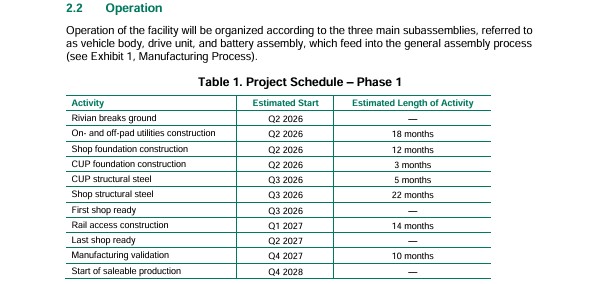
Rivian (RIVN) is moving closer to restarting construction at its $5 billion EV plant in Georgia after pausing it months ago. The company recently took a significant step by applying for a federal loan to get its second manufacturing plant back on track.
After revealing its smaller, more affordable R2 vehicle in March, Rivian said it would begin building it in Normal, IL, rather than its new Georgia plant as initially planned.
According to CEO RJ Scaringe, the move would save Rivian over $2 billion while getting R2 on the market quicker. Despite this, Rivian has repeatedly insisted it remains committed to the project as it expands production.
Rivian is expected to begin building R2 models in the first half of 2026, followed by the even more affordable R3 and R3X. According to a new filing with the US Department of Energy, Rivian plans to build vehicles in Georgia shortly after.
The filing states that Rivian’s upcoming Georgia EV plant will begin operations in Q3 2027, but it’s not expected to run at full capacity until 2028.

Rivian is restarting Georgia EV plant construction soon
Rivian is expected to break ground in Georgia in the second quarter of 2026. By Q3 2026, the first shop should be ready, according to the filing. The last shop will be ready by Q2 2027, and production models are expected to go on sale in Q4 2028.

Financially supporting the project will bring 400,000 EVs to market, “thereby reducing overall national emissions of air pollutants and human-caused GHGs,” the filing read. Despite this, the DOE has yet to make a final decision.
Rivian’s Georgia EV plant is the second-largest development project in the state behind Hyundai’s $7.6 billion facility that began production last week.

The 1,744-acre site, 40 miles east of Atlanta, consists of 44 parcels of land. It will consist of two production blocks, each with a capacity of up to 200,000 vehicles annually.
Rivian’s filing comes after the company lowered its production guidance for the year following Q3 deliveries on Friday. The company now expects to build between 47,000 and 49,000 vehicles in 2024, down from its previous 57,000 target.
Source: The Atlanta Journal-Constitution, DOE
